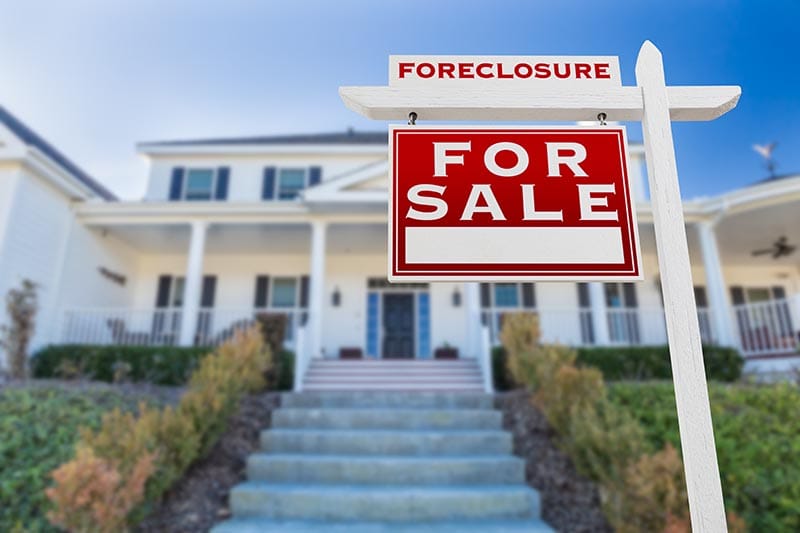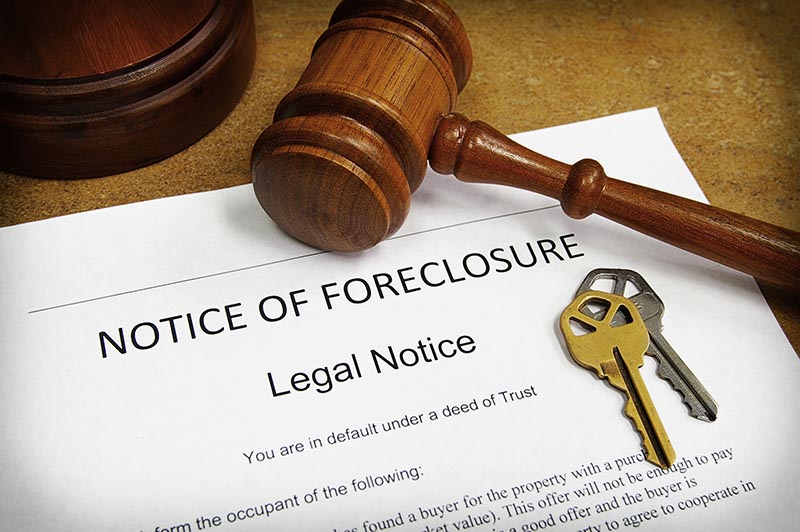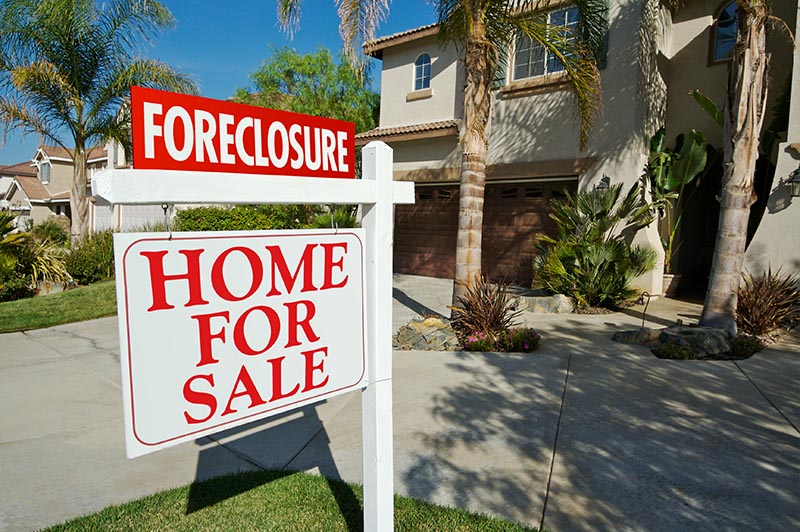What Does Foreclosure Mean? Real Estate Terms Explained
-
Codee Chessher
- Last updated:

When a home is foreclosed on, it’s commonly called a foreclosed home, foreclosure home, or sometimes just a foreclosure lot. Foreclosure is a thorny topic because on one side, it’s the bank taking away their home. To others, it’s a great opportunity to invest in the real estate market.
What most do agree on is that foreclosure is a complicated process, and it’s not always easy to understand or navigate. In short, it is a process, when your lender repossesses a home you took a mortgage on, after missing three payments. In this article, we’ve compiled all the info you need to know about how foreclosures work.
Let’s dive in below so you can better navigate foreclosure, whether your home is being foreclosed on or if you’re looking to buy foreclosed homes yourself.
How Does Foreclosure Work?
Foreclosure is a process where your lender, typically a bank, repossesses your home that you’ve taken a mortgage out on. Foreclosure is initiated after 120 days of “pre-foreclosure,” where your lender will offer some loss mitigation options. These range from brief forbearances to short sales and other complex stuff, but we’ll get into those later on.
Foreclosure is usually a standard process that follows a predictable timeline. Let’s take a brief look at the steps of foreclosure below so you can get a better idea of how it works.

- You miss a mortgage payment.
- After 30 days, the missed payment is reported to credit bureaus and can have a negative effect on your credit.
- If you miss a second payment at 60 days, your lender typically reaches out to offer loss mitigation options – these include modification, short sales, and forbearances. The second missed payment is also reported to credit bureaus at 60 days.
- Your lender will contact you again at 90 days if you miss a third payment and report it to credit bureaus.
- If you haven’t arranged a forbearance or modification at 120 days, your lender can start the foreclosure process.
Depending on your state, a lender has to actually file a civil lawsuit to recoup their investment via foreclosure. This is called judicial foreclosure, which may be required by state law or if the mortgage contract didn’t include a clause authorizing the lender the power to sell the property as a result of non-payment. In legalese, they call this a power of sale clause.
In many cases, the lender will sell the house outright to someone else, even if you’re still living there. It would be up to the new owner to have you kicked out. A 3-day notice to vacate is pretty standard in those cases, but it varies a lot by state. Lenders who sell the house at auction usually don’t want to bother renovating it and selling it after the foreclosure, so auctions are an attractive option for them to recoup as much money as possible.
What Are the Different Types of Foreclosure?
There are three main types of foreclosures: judicial, power of sale, and strict foreclosure. Each one has a different process, but they all end up with the lender repossessing the foreclosed home. Let’s take a look at those.

Judicial
Judicial foreclosure is a type of foreclosure that requires the lender to file a civil lawsuit as part of the process. Once a judge gives them a court order, they can legally take the property back. All states allow this type of foreclosure, and some states require it. If you don’t contest the foreclosure, you’ll typically receive a notice that you have 30 or 60 days to vacate the premises. Depending on how long the lawsuit takes, a house can be technically ‘in foreclosure’ for years.
Power of Sale (Nonjudicial)
AKA statutory foreclosure, this type of foreclosure is permitted in 29 states. It provides the lender with a lot of freedom in recouping their investment. Instead of going through a lengthy judicial process, the lender can simply insert a power of sale clause in the mortgage contract. The legal language says that the lender can sell the house at auction to recoup their investment in the event of non-payment. These foreclosures are much swifter than judicial ones, taking an average of 45 to 60 days.
Strict Foreclosure
This special type of foreclosure is only permitted in Connecticut and Vermont. It occurs most frequently when the amount owed by the homeowner exceeds the property’s value. Strict foreclosures are judicial, meaning the lender has to file a suit, but there’s a twist: if the homeowner doesn’t pay the mortgage within a set time limit, the home’s deed automatically transfers back to the lender.
Advantages of Foreclosure
Look, we’ll just get this out of the way: it sucks when your house is foreclosed on. However, the silver lining is that there are a scant few advantages to the situation you may not be aware of.
Pros of Foreclosure include:
- Sometimes foreclosure isn’t the end! In many instances, your lender would rather negotiate a forbearance or modification than foreclose.
- You can save the money that would have gone to your mortgage during the foreclosure period – this way you have a nest egg to look for a home that fits your situation better.
- You get some breathing room. Homes are a ton of work and money to maintain, and foreclosure gives you a chance to reassess your financial situation and scrap renovation plans.
Disadvantages of Foreclosure
There are some hefty cons to foreclosure, which comes as no great shock to anyone. It’s best to avoid foreclosure at all costs to avoid suffering some serious consequences.
Cons of Foreclosure include:
- Losing your home.
- Your credit score will plummet – the higher your score before the foreclosure, the farther it will fall.
- You’ll have a tougher time getting a rental or mortgage in the future, which may cost you more money in security deposits upfront when you get a new place.
Frequently Asked Questions (FAQs)

How can I avoid foreclosure on my home?
The best way to prevent foreclosure is to communicate with your lender before you miss a payment. They’ll be inclined to work with you because they don’t really want to foreclose. They’ll be able to walk you through your loss mitigation options. Let’s take a brief look at some of the most common options used by lenders to help you keep your home.
Types of Loss Mitigation Options:
- Forbearance: a temporary ‘pause’ on your mortgage, commonly extended by lenders during times of financial hardship. You’ll eventually have to pay back the payments you weren’t able to make during the forbearance period, but terms may be negotiated on a case-by-case basis.
- Modification: modifications make your mortgage current by rolling past-due payments into the total loan amount. You’ll have some initial breathing room, but you’ll still have to pay it eventually.
- Repayment plan: this splits up the missed payment(s) and tacks them onto your future payments. More useful than modification because you don’t push back your payment timeline, but your payments will cost a lot more until you pay off the missed payment. Terms are negotiated on a case-by-case basis.
- Reinstatement: the most useful but most difficult option, reinstatement involves promising to pay back your missed payments after a forbearance period. An example of when this would be useful is if your paycheck gets lost in the digital ether and you can’t pay the mortgage until you get your money.
Who pays foreclosure costs?
It depends. If the homeowner pays their mortgage off, they’ll be on the hook for the foreclosure costs. If the lender sells the home at auction, the new owner would be financially liable for those costs.
Can I just give my home back to the lender?
Yes! This is known as a ‘deed in lieu of foreclosure,’ and can help save you from the negative impact that a foreclosure has on your credit. You give the home back to the lender in exchange for them releasing you from the mortgage, and you only suffer a short-term hit to your credit.
Conclusion
Foreclosures can be a very short or very long process, and they’re not fun for anyone involved. Lenders can repossess the home once given a court order in the event of a judicial foreclosure, while power of sale foreclosures allow them to simply sell the house outright at auction. Being familiar with the terms of your mortgage is essential in navigating foreclosure because no two situations are alike.
Featured Image Credit: Andy Dean Photography, Shutterstock
Contents
